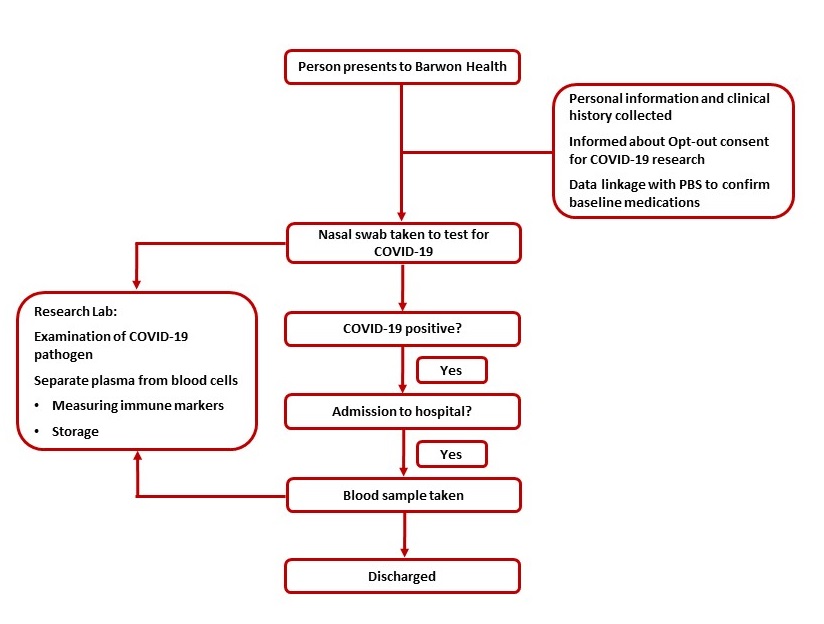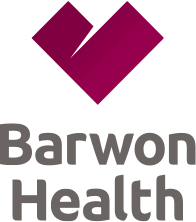Our research
The Department of Infectious Diseases Research Team, in partnership with the Geelong Centre for Emerging Infectious Diseases (GCEID), is a multidisciplinary group that tackles the transmission, treatment and prevention of some of the public’s most pressing health challenges, including:
- COVID-19

- Healthcare-associated infections
- Emerging infectious diseases
- Mycobacteria ulcerans (Buruli Ulcer)
- Infections of medical devices
- C. difficile infection
- Hepatitis C
- Infective endocarditis (infection of the heart)
- Antimicrobial resistance
In addition, we are leaders in the development of strategies and safeguards in the areas of refugee health and antimicrobial stewardship (responsible use of antibiotics).
Our Department is also a significant and active member of the Barwon Health Clinical Trials Unit (CTU), which, over 25 years and with the contribution of thousands of volunteers, is regarded as one of the leading hubs for clinical trials in the development of new treatments and technologies. The CTU is renowned for its start-up timelines and is a national lead on the majority of its global commercially sponsored clinical trials.
COVID-19 Research
Coronavirus (COVID-19) has been designated by the WHO as a global pandemic. Many countries, including Australia, have put in place an unprecedented range of interventions that aim to slow the spread of the virus and prepare their health systems. Important research questions have emerged and it is crucial that a coordinated and efficient approach is taken to providing answers.
The Barwon Health and Deakin University Coronavirus Research Task Force has been formed to harness our collective talents and resources to contribute to these key research questions.
Key Research Questions
|
What is the clinical range of Coronavirus infections in the Barwon population? |
|
What proportion of people infected with Coronavirus in the Barwon population:
|
|
What are the risk factors for more severe disease with Coronavirus? These may include:
|
|
What is the immune response to Coronavirus infection that:
|
|
How does the immune response to Coronavirus infection vary between children and adults? |
|
Are differences in the virus or the presence of other disease-causing organisms important? |
Current Research Study
To seek answers to these research questions and more, we need to collect relevant health information and laboratory/pathology samples as part of your routine care to enable us to conduct this research.
If you attend a Barwon Health site due to suspected Coronavirus, we will include your results and health information in this research. If you do not wish to participate in this research, you can choose to opt-out. Choosing to opt-out will not affect the quality of the care you receive in any way.
Barwon Health researchers may collect and use the following for Coronavirus research:
- Your health information
- Your nasal swab sample, if collected as part of Coronavirus testing
- An additional blood sample, if a blood test is collected
- Data from the Pharmaceutical Benefits Scheme to clarify which medications you have been prescribed
- Your contact details, as you may be recontacted in relation to future Coronavirus research projects
Study Design

Find out more
Download the Patient Information Brochure
Contact the Project Coordinator on 0428 498 702 or This email address is being protected from spambots. You need JavaScript enabled to view it.
Opt-out
If you choose to opt-out, your health information and samples will not be available to researchers. Choosing to opt-out will not affect the quality of the care you receive in any way.
To opt-out, you will need to provide your full name, address and date of birth to the research team quoting “HREC 20/56” via one of the following mechanisms:
Transmission of Buruli Ulcer
Supported by a $3 million NHMRC Partnership across Barwon Health, Deakin University, CSIRO and the University of Melbourne, we lead several clinical studies and a large case-control study to help identify the potential environmental and behavioural factors causing disease transmission. We were invited to present their world-leading research at the WHO Buruli ulcer meeting in Geneva in 2019.
Our team have also published an article in the Clinical Infectious Disease Journal that for smaller Buruli ulcers, six weeks may be as effective as the currently recommended eight weeks of combined antibiotic therapy in curing lesions without surgery.
Real-world efficacy of Antiviral therapy in chronic hepatitis C (REACH-C)
Reach-C is a cohort study being run by the Kirby Institute collecting real-world outcomes for direct-acting antiviral treatment for Hepatitis C infections.
Current estimates of the efficacy of new hepatitis C medications are based on data from populations that are not consistent with Australians living with hepatitis C. Understanding the new patterns of treatment prescription, as well as treatment outcomes in real-world settings, is critical to inform planning for future HCV services within Australia.
Barwon Health has contributed over 240 patients to this study, which will identify factors that lead to treatment success or failure in the Australian context. This in turn will better equip health care professionals to improve communication with their patients and the public around the treatment for hepatitis C.
Clinical trials including COVID vaccines
We have been conducting investigator-initiated and commercially sponsored clinical trials for over 12 years. Clinical trials have been conducted in collaboration with the Clinical Trial Unit and Paediatric team, and focus on prevention and treatment of diseases such as Meningococcal, Shingles, Clostridium difficile, Osteomyelitis, Bacteraemia, Influenza, Respiratory Syncytial Virus (RSV), and more recently on Clinical Trials to address the COVID-19 pandemic.
Trials conducted by the Department have led to the development of preventative vaccines for Influenza and Shingles, There are currently eight clinical trials in infectious disease, including a world-first trial into a Clostridium difficile vaccine and two trials addressing COVID-19.
Last Modified: Tuesday, 05 July 2022
